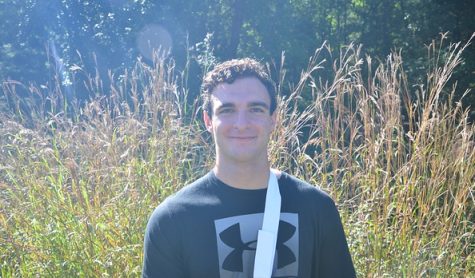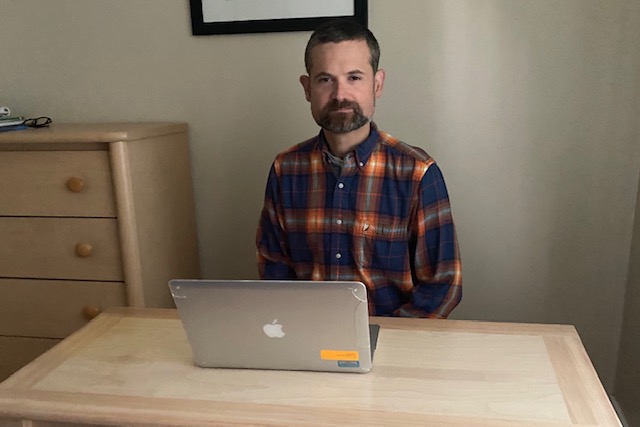WHS teachers find opportunities and obstacles in remote learning
The school year has begun completely virtual with four 80 minute classes taken from home every Monday, Tuesday, Thursday and Friday. Plenty of students have made their opinions on virtual learning clear, but teachers have their thoughts on the topic as well.
Many teachers recognize the value of having an in-person connection with their students in class. Without that advantage, it could prove more difficult to understand each individual in the class, making the remote learning process even harder.
“I miss the face-to-face aspect of in-person teaching,” English teacher Zachary Vonnegut said. “I think face-to-face contact makes it easier to use humor and to develop strong relationships. I also found it harder to lead discussions as a remote teacher, though I’ve got some ideas now about how I might do that.”
With computers now taking on an even larger role in the education process, it has become all the more important that student and teacher technology works smoothly. And this is not made easier by students and teachers alike learning how to access and set up new programs and accounts.
“The hardest part of virtual learning was learning the technologies and trying to translate our lessons, which are so interactive when we’re in the classroom, into basically rigid slide decks,” English teacher Sara Snow said. “The good thing about that is it’s going to be a lot more consistent. The bad thing about that is it’s going to be a lot less dynamic and interactive.”
Virtual learning has caused teachers to alter their approach to how they teach their students. With less time to teach, they now focus even more on if an assignment is necessary or not.
“I think one good thing about the COVID-19 shutdown is that it has caused many teachers to rethink what we do and why,” Vonnegut said.
During the summer, teachers learned new techniques to further their teaching come fall. While it is still yet to be seen just how much virtual learning has improved, WHS has put effort into making it easier and more comfortable.
“I think we’ve learned a lot, and Wayland has been amazing,” Snow said. “I’ve heard of so many other school districts where the teachers have basically no professional development in terms of online technology. Mrs. Barber and her cohorts have been actually amazing.”
Last year’s virtual learning was new to most teachers and students, which created problems. But there were also a few surprise positives that teachers noticed as well.
“I actually had some amazing work from some of my students during the March to June period, partly because we weren’t grading so my students took more risks,” Snow said. “I heard that a lot from the other English teachers [as well]. They took more risks with their writing, and some students really improved their writing and I don’t think they [necessarily] would’ve done [so] had we stayed in school.”
This year, there may also still be some positives from remote learning. And in some teachers’ opinions, hybrid may be the best option for the rest of the year.
“[Virtual learning] does have some advantages once you get used to it,” Vonnegut. “I like how you can give students a bit more flexibility about when and how they get things done. At this point, my ideal would be some sort of hybrid approach where students have each class a few times a week and have more time to work on projects, etc. independently.”
One of the biggest drawbacks of virtual learning is the lack of socializing that would normally happen in school. Not only for students but teachers as well.
“I think it’s tough for kids and teachers,” math teacher Charlene Bishop said. “I feel for the kids. They want to see their friends and experience high school.”
What should be remembered is that remote learning is still very new. While it certainly helps to be focused and hardworking, trust and strong communication between families and teachers can’t be overlooked.
“We’re building the bike and riding it at the same time,” Snow said. “Everyone is on this learning curve together, and I think that everyone needs to know—families, students, everyone— that teachers have always done and will always do the best they possibly can. We need to trust each other and communicate.”
Your donation will support the student journalists of Wayland High School. Your contribution will allow us to purchase equipment, cover our annual website hosting costs and sponsor admission and traveling costs for the annual JEA journalism convention.

Dante Coppola, Class of 2022, is the head sports section editor for WSPN, and is in his second year with the publication. He plays lacrosse and football...





![Last Wednesday, the Wayland School Committee gathered to discuss a number of topics regarding the health curriculum and Innovation Career Pathway course. Another large topic of conversation was the ways to potentially mitigate distracting cell phone usage. "These [phones] are going to distract your learning and social relationships," Superintendent David Fleishman said. "That's concrete right there."](https://waylandstudentpress.com/wp-content/uploads/2025/06/Screenshot-2025-06-04-at-9.49.31 PM-1200x886.png)























